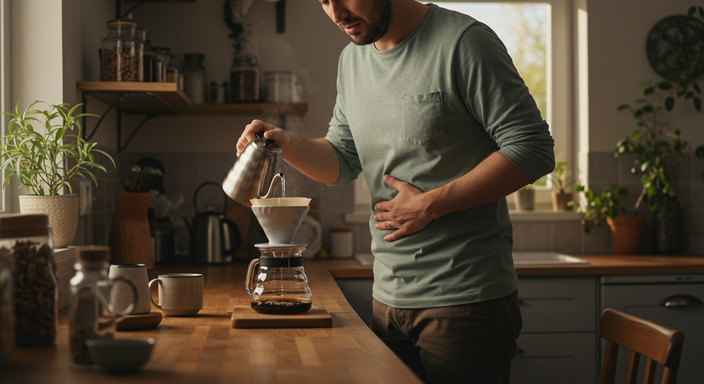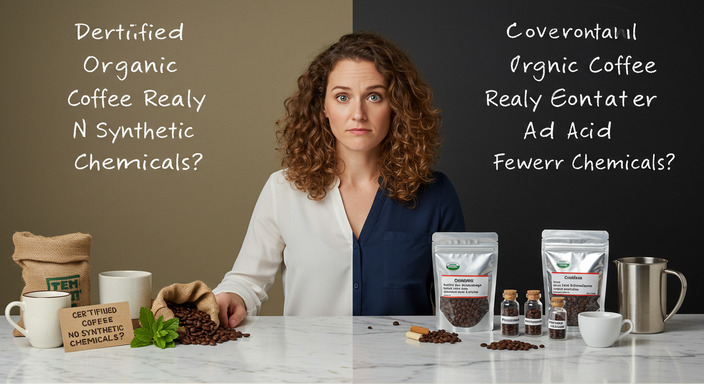
How to Verify Organic Claims on Coffee Bags

Table of Contents
ToggleWhat Does “Organic” Really Mean?
Understanding Organic Coffee
When you see the term “organic” on a coffee bag, it means the coffee was grown and processed under strict guidelines set by certifying bodies, such as the USDA (United States Department of Agriculture). Organic coffee is cultivated without the use of synthetic pesticides, chemical fertilizers, or genetically modified organisms (GMOs). Instead, farmers rely on natural methods like composting, crop rotation, and shade-growing to maintain soil health and protect the environment.
To earn the organic label, coffee must also be roasted and processed in facilities that adhere to organic standards, ensuring no harmful chemicals or additives are introduced during production.
Key Benefits of Choosing Organic
Opting for organic coffee isn’t just a choice for your health—it’s a decision that supports the planet and ethical farming practices. Here are some of the primary benefits:
- Healthier for You: Organic coffee is free from synthetic chemicals, reducing your exposure to potentially harmful residues found in conventionally grown coffee.
- Better for the Environment: Organic farming practices promote biodiversity, conserve water, and reduce pollution, helping to protect ecosystems and wildlife.
- Supports Fair Labor Practices: Many organic coffee producers prioritize fair wages and safe working conditions for farmers, contributing to more equitable trade systems.
By choosing organic, you’re not just savoring a cleaner cup of coffee—you’re making a positive impact on the world around you.
Why Verification Matters
The Problem with Greenwashing
In today’s market, it’s not uncommon to see labels like “natural” or “eco-friendly” splashed across coffee bags. However, these terms often lack regulation, leading to a practice known as greenwashing. Greenwashing occurs when companies mislead consumers about the environmental or ethical benefits of their products. For example, a coffee brand might claim to be organic without holding proper certification. This not only deceives consumers but also undermines the efforts of genuinely sustainable producers who adhere to strict organic standards.
By verifying organic claims, you ensure that your coffee aligns with your values—whether that’s protecting the environment, supporting fair trade practices, or safeguarding your health.
Health Impacts of Truly Organic Coffee
Organic coffee isn’t just a buzzword; it’s a healthier choice. Coffee grown without synthetic pesticides, herbicides, or chemical fertilizers reduces your exposure to potentially harmful substances. Studies suggest that organic farming methods can result in coffee with higher antioxidant levels, which are beneficial for your overall well-being.
- No synthetic pesticides: Reduces toxins in your cup.
- Nutrient-rich soil: Enhances the coffee’s natural flavors and benefits.
- Healthier farmers: Minimizes chemical exposure for those who grow your coffee.
By choosing verified organic coffee, you’re not just enjoying a better cup—you’re investing in your health.
Environmental Benefits of Organic Farming
Organic coffee farming prioritizes sustainable practices that protect the planet. Traditional coffee farming often relies on chemical inputs that degrade soil quality, harm wildlife, and pollute water sources. In contrast, organic farming emphasizes:
| Practice | Impact |
|---|---|
| Natural pest control | Preserves biodiversity and protects ecosystems. |
| Composting | Enriches soil health and reduces waste. |
| Shade-grown methods | Reduces deforestation and supports bird habitats. |
When you verify organic claims, you’re supporting farming methods that safeguard the environment for future generations.
Key Certifications to Look For
USDA Organic Certification
When you see the USDA Organic seal on a coffee bag, it’s a clear sign that the coffee meets strict federal guidelines for organic farming. This certification ensures that the coffee is grown without synthetic pesticides, herbicides, or genetically modified organisms (GMOs). Farmers must also follow sustainable practices that protect soil health and water quality. Choosing USDA Organic coffee not only supports your health but also promotes environmentally friendly farming methods.
Other Recognized Certifications
Beyond USDA Organic, there are several other certifications that highlight ethical and sustainable practices in coffee production. Here are a few to look for:
- Fair Trade Certified: This certification ensures that farmers are paid fair wages and work under safe conditions. It also supports community development projects in coffee-growing regions.
- Rainforest Alliance Certified: Coffee with this seal is grown on farms that meet rigorous standards for biodiversity conservation, worker well-being, and sustainable land management.
- Bird Friendly Certified: This certification, backed by the Smithsonian Migratory Bird Center, guarantees that coffee is shade-grown, preserving habitats for birds and other wildlife.
These certifications go beyond organic farming to address broader issues like social equity and environmental conservation. By choosing coffee with these labels, you’re making a positive impact on both people and the planet.
How to Spot Genuine Organic Coffee
Reading Labels and Understanding Symbols
When you’re browsing the coffee aisle, the first step to identifying genuine organic coffee is to carefully read the labels. Look for specific terms like “Certified Organic” or “100% Organic,” as these indicate the product meets strict organic standards. Additionally, pay attention to symbols and logos that represent organic certification, such as the USDA Organic seal. This green and white label is a reliable indicator that the coffee has been produced without synthetic pesticides, chemical fertilizers, or genetically modified organisms (GMOs).
Keep in mind that some coffee brands may use phrases like “natural” or “eco-friendly,” but these terms don’t necessarily mean the product is organic. Always look for official certification marks to ensure you’re getting the real deal.
Checking for Third-Party Verification
One of the most trustworthy ways to confirm the authenticity of organic coffee is to check for third-party verification. These independent organizations rigorously evaluate coffee production processes to ensure they comply with organic standards. Some of the most recognized certifying bodies include:
- USDA Organic – The gold standard for organic certification in the U.S.
- Fair Trade Certified – Ensures ethical sourcing and sustainable farming practices.
- Rainforest Alliance Certified – Focuses on environmental and social responsibility.
These certifications not only guarantee that the coffee is organic but also often indicate that the farmers are paid fairly and that the environment is protected. By choosing coffee with third-party verification, you’re supporting a healthier planet and more equitable trade practices.
Steps to Verify Organic Claims
Researching the Brand and Its Sourcing Practices
When verifying organic claims on coffee bags, start by researching the brand’s reputation and its commitment to sustainability. Look for information about where they source their coffee beans and how they ensure organic practices. Ethical brands are often transparent about their supply chain, providing details about their farming partners and the regions they work with.
Visit the brand’s official website and check for sections like “About Us,” “Our Mission,” or “Sustainability.” These pages often highlight their dedication to organic farming, fair trade, and eco-friendly practices. If they’re genuinely committed, they’ll proudly share their story and values.
- Look for mention of partnerships with certified organic farms or cooperatives.
- Check if they emphasize environmental stewardship or ethical sourcing.
- Read customer reviews or third-party articles to gauge their credibility.
Using Online Resources to Confirm Certifications
Certifications are one of the most reliable ways to verify organic claims. Look for official seals from recognized organizations like the USDA Organic, Fair Trade, or Rainforest Alliance. These certifications ensure that the coffee meets strict organic standards, from farming practices to processing.
Here’s how to confirm these certifications:
- Visit the certifying organization’s website (e.g., USDA Organic) and use their search tool to verify the brand or product.
- Check the coffee packaging for certification logos and cross-reference them with the certifier’s official list.
- Look for additional certifications that align with your values, such as Fair Trade for ethical labor practices or Bird Friendly for biodiversity conservation.
Remember, while certifications are a strong indicator, they’re only one piece of the puzzle. Pair this information with your research on the brand’s overall practices to make a well-informed decision.
Benefits of Choosing Truly Organic Coffee
Health Advantages for Consumers
Choosing organic coffee isn’t just a trend—it’s a healthier choice for your body. Unlike conventionally grown coffee, organic coffee is free from synthetic pesticides, herbicides, and chemical fertilizers. These chemicals can leave residues on coffee beans, which may end up in your cup. By opting for organic, you’re reducing your exposure to potentially harmful substances, which can be especially important for those with sensitivities or long-term health concerns.
Additionally, organic coffee is often richer in antioxidants, which help combat oxidative stress in the body. Studies suggest that coffee is one of the primary sources of antioxidants in many diets, and organic varieties may contain even higher levels due to the natural farming methods used. This means your morning ritual could be doing even more to support your overall wellness.
Positive Impact on Farmers
When you choose organic coffee, you’re also supporting the livelihoods of farmers who practice sustainable agriculture. Organic farming often requires more labor-intensive methods, such as manual weeding and composting, which can provide more stable and fair employment opportunities for farming communities. Farmers who grow organic coffee are typically paid a premium for their crops, which helps improve their quality of life and economic stability.
Moreover, organic farming promotes environmental stewardship. Farmers are encouraged to work with nature rather than against it, preserving the health of their land for future generations. This shift away from chemical dependence empowers farmers to take pride in their work while fostering a deeper connection to the environment.
Environmental Benefits
Organic coffee farming is a win for the planet. By eliminating synthetic chemicals, organic farms reduce water pollution and soil degradation, helping to protect ecosystems and biodiversity. Coffee is often grown in regions with rich, diverse wildlife, and organic practices ensure that these habitats remain intact.
- Carbon sequestration: Organic farms often use shade-grown methods, which involve growing coffee under a canopy of trees. This not only provides a natural habitat for birds and other wildlife but also helps capture carbon dioxide from the atmosphere.
- Soil health: Organic practices like composting and crop rotation enrich the soil, making it more resilient to erosion and climate change.
- Water conservation: By avoiding chemical runoff, organic farming protects local water sources, ensuring cleaner drinking water for communities and healthier ecosystems for aquatic life.
Choosing organic coffee is a simple yet powerful way to contribute to a healthier planet. Every sip supports practices that prioritize the well-being of people, animals, and the environment.
Making Informed Coffee Choices
Choosing organic coffee is more than just a trend—it’s a step toward healthier living, environmental stewardship, and ethical consumption. But with so many brands claiming to be organic, how can you ensure you’re making the right choice? Here’s how to navigate the world of organic coffee and make decisions that align with your values.
Tips for Finding Reliable Organic Brands
When shopping for organic coffee, it’s essential to look beyond the label. Here are some practical tips to help you identify trustworthy brands:
- Check for certifications: Look for seals like USDA Organic, Fair Trade, or Rainforest Alliance. These certifications ensure the coffee meets strict organic and ethical standards.
- Research the brand’s practices: Visit the company’s website to learn about their sourcing methods, sustainability efforts, and commitment to fair labor practices.
- Read reviews: Consumer feedback can provide insights into the quality and authenticity of the product.
- Support local roasters: Smaller, local coffee roasters often prioritize transparency and sustainability.
Encouraging Sustainable and Ethical Consumption
Beyond choosing organic, there are other ways to make your coffee habit more sustainable and ethical:
- Opt for shade-grown coffee: Shade-grown coffee preserves biodiversity and protects ecosystems, making it a more environmentally friendly choice.
- Choose fair trade: Fair Trade certification ensures farmers receive fair wages and work in safe conditions.
- Reduce waste: Use reusable coffee cups, compost coffee grounds, and avoid single-use pods.
- Buy in bulk: Purchasing larger quantities reduces packaging waste and often saves money.
By making thoughtful choices, you can enjoy your daily cup of coffee while supporting practices that benefit both people and the planet.
FAQ About Organic Coffee
What makes coffee organic? Organic coffee is grown without synthetic pesticides, herbicides, or fertilizers, and it’s certified by organizations like the USDA. Is organic coffee healthier? Yes, organic coffee is free from harmful chemicals, making it a safer and cleaner option for consumers. Does organic coffee taste better? Many people find that organic coffee has a purer, more natural flavor due to the absence of synthetic chemicals.
Choosing organic coffee is a small but meaningful way to support your health, protect the environment, and promote ethical practices. Every cup you enjoy becomes a statement of your commitment to a better world.
is a writer and editor at Coffee With Finance, blending her love for coffee, personal finance, and visual storytelling. She crafts engaging articles, curates site images, and shares brewing tips, bean origins, and practical money advice. Anna believes that managing finances, like making great coffee, should be intentional and rewarding — bringing clarity, warmth, and beauty to every story she tells.




























Post Comment